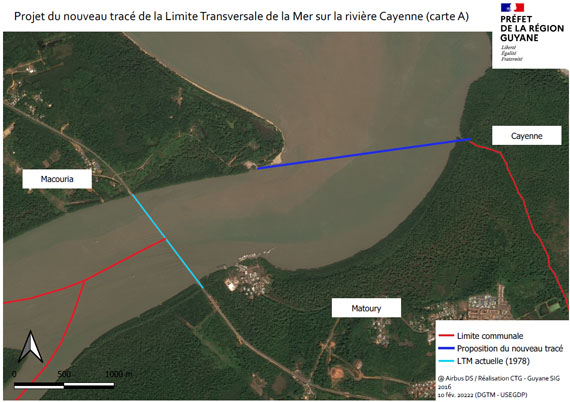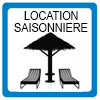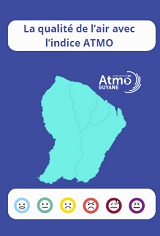Blada.com
samedi 12 juillet
Boîtes aux lettres
Courrier des lecteurs
Petites annonces
Emploi / Formation
Covoiturage
Infos citoyennes
Infos citoyennes
17/03/22
Modifier la limite transversale de la mer : une troisième tentative pour installer la centrale du Larivot ?
 Jusqu’au 21 mars 2022, une consultation publique est ouverte pour recueillir l’avis des citoyens sur la modification de la limite transversale de la mer de la commune de Matoury, qui détermine l’application de la Loi Littoral. Or l’application de la Loi Littoral est un point bloquant la construction de la centrale du Larivot: faire sortir la commune de Matoury de la liste des communes littorales aurait pour effet de légitimer ce projet et faire échec à l’un des recours portés par les associations environnementales. Guyane Nature Environnement s’oppose à l’utilisation de cette consultation à ces fins, d’autant que cette question est posée pour une troisième fois malgré les avis défavorables de deux commissions d’enquête.
Jusqu’au 21 mars 2022, une consultation publique est ouverte pour recueillir l’avis des citoyens sur la modification de la limite transversale de la mer de la commune de Matoury, qui détermine l’application de la Loi Littoral. Or l’application de la Loi Littoral est un point bloquant la construction de la centrale du Larivot: faire sortir la commune de Matoury de la liste des communes littorales aurait pour effet de légitimer ce projet et faire échec à l’un des recours portés par les associations environnementales. Guyane Nature Environnement s’oppose à l’utilisation de cette consultation à ces fins, d’autant que cette question est posée pour une troisième fois malgré les avis défavorables de deux commissions d’enquête.
Un moyen détourné de permettre l’installation de la centrale du Larivot?
La limite transversale de la mer actuelle fait de Matoury une commune du littoral, par sa proximité avec l’océan, à travers les estuaires du Mahury et de la rivière de Cayenne, et par les dynamiques physiques qu’on y observe. La commune de Matoury est ainsi soumise à la Loi relative à l'aménagement, la protection et la mise en valeur du littoral, dite Loi Littoral du 3 janvier 1986.
Selon la Loi Littoral, les constructions dans les espaces proches du rivage ne peuvent être réalisées que dans des zones occupées par de l’urbanisation diffuse, ce qui n’est pas le cas de la zone du Larivot comme l’a retenu le tribunal administratif de Cayenne en juillet dernier. L’installation de la nouvelle centrale thermique d’EDF-PEI au lieu-dit du Larivot, se heurte donc à l’application de la Loi Littoral.

Cependant, cette conséquence centrale induite par la modification de la limite transversale de la mer n’est pas explicitée dans le rapport d’instruction, alors qu’elle aurait dû y figurer pour une bonne information des citoyens, selon la commission d’enquête qui s’était penchée sur le sujet en 2019.
Une troisième tentative malgré les avis défavorables exprimés
En effet, cette question a déjà été posée à deux reprises dans le cadre d’enquêtes publiques, en 2019 et en 2020 et la commission d’enquête avait donné deux avis défavorables, ce qui est exceptionnel. Il s’agit donc de la troisième fois que la question est posée, cette fois-ci sous la forme d’une consultation électronique, un mode de participation allégé qui ne requiert pas la désignation d’un commissaire enquêteur, dont la fonction est d’informer largement les citoyens, de répondre à leurs questions et de recueillir leur avis afin de proposer un avis éclairé sur la question.
Guyane Nature Environnement est donc fermement opposée à cette consultation, tant sur sa forme allégée que sur son fond non explicité.
 Until March 21, 2022, a public consultation is open to gather the opinion of citizens on the modification of the transverse limit of the sea of the municipality of Matoury, which determines the application of the Coastal Law. However, the application of the Coastal Law is a point blocking the construction of the Larivot power plant: removing the municipality of Matoury from the list of coastal municipalities would have the effect of legitimizing this project and defeating one of the appeals brought by environmental associations. Guyane Nature Environnement opposes the use of this consultation for these purposes, especially since this question is being asked for a third time despite the unfavorable opinions of two commissions of inquiry.
Until March 21, 2022, a public consultation is open to gather the opinion of citizens on the modification of the transverse limit of the sea of the municipality of Matoury, which determines the application of the Coastal Law. However, the application of the Coastal Law is a point blocking the construction of the Larivot power plant: removing the municipality of Matoury from the list of coastal municipalities would have the effect of legitimizing this project and defeating one of the appeals brought by environmental associations. Guyane Nature Environnement opposes the use of this consultation for these purposes, especially since this question is being asked for a third time despite the unfavorable opinions of two commissions of inquiry.
A roundabout way to allow the installation of the Larivot power plant?
The transverse limit of the current sea makes Matoury a coastal town, by its proximity to the ocean, through the estuaries of Mahury and the Cayenne river, and by the physical dynamics observed there. The municipality of Matoury is thus subject to the Law relating to the development, protection and enhancement of the coast, known as the Coastal Law of January 3, 1986.
According to the Littoral Law, constructions in spaces close to the shore can only be carried out in areas occupied by diffuse urbanization, which is not the case of the Larivot area as held by the administrative court. of Cayenne last July. The installation of the new EDF-PEI thermal power plant at a place called Larivot therefore comes up against the application of the Coastal Law.

However, this central consequence induced by the modification of the transverse limit of the sea is not explained in the investigation report, whereas it should have appeared there for the good information of the citizens, according to the commission of inquiry which looked into the subject in 2019.
A third attempt despite the unfavorable opinions expressed
Indeed, this question has already been asked twice in the context of public inquiries, in 2019 and 2020 and the commission of inquiry had given two unfavorable opinions, which is exceptional. This is therefore the third time that the question has been asked, this time in the form of an electronic consultation, a simplified mode of participation which does not require the appointment of a commissioner of inquiry, whose function is to widely inform citizens, answer their questions and gather their opinion in order to offer an informed opinion on the issue.
Guyane Nature Environnement is therefore firmly opposed to this consultation, both in its simplified form and in its non-explained substance.
Raccourcis


passer une petite annonce

passer une annonce de covoiturage


passer une annonce d’emploi







associations, postez vos actualités

participez au courrier des lecteurs
La Guyane c’est ici
La qualité de l’Air avec
ATMO
Photothèque

Lancements 2022
Vol 259 Ariane 5




